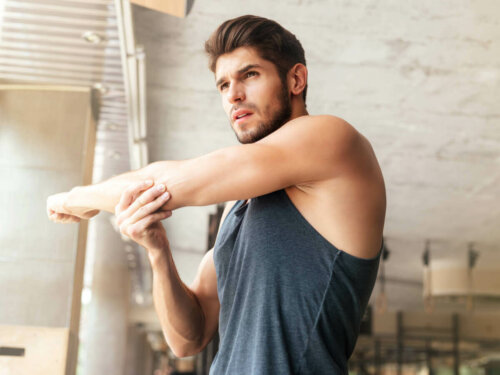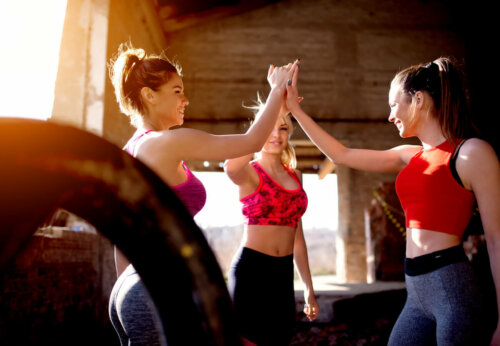How to Be More Confident in Sports

Working to be more confident is a fundamental task for any athlete. Self-confidence fuels effort and boosts perseverance during adversity.
Confidence isn’t a static variable. In fact, external events or people greatly influence it in a positive or negative way. For example, a difficult opponent or competing at an unfamiliar location can affect an athlete’s confidence in victory.
However, this doesn’t mean that nothing can be done about it. The key is knowing how to identify problematic situations and having the resources to avoid this confidence from faltering.
Athletes with greater self-confidence believe in their abilities to succeed. They’re also able to better organize their resources, plan actions, and adapt to unforeseen events. For all of these reasons, in this article, we’ll tell you how to be more confident in sports.
Change the focus of your motivation to be more confident
A motivational approach refers to how an athlete performs, trains, and gives their all during competitions. Understanding motivation can provide valuable information about what the athlete wants, what to avoid, as well as how to boost their self-confidence.
There are two motivational approaches. On one hand, there’s mastery orientation, when the source of motivation is the improvement of abilities and achieving personal goals. On the other hand, performance orientation is when the person seeks to compare themselves to others and strive to be better.
To build self-confidence and to be more confident, mastery orientation is preferable. Reaching goals and improving skills is a very beneficial double self-confidence booster.

Set appropriate goals for your level
Although it may seem a simple task, it might be puzzling for athletes to know how to correctly set goals. When it comes to setting goals, quality is more important than quantity.
In other words, it’s best to set a few good quality goals that you’re more likely to reach rather than setting goals that frustrate you because they’re unobtainable.
An effective way to approach goal setting is to see them as a ladder in which each rung is a small step. Also, it’s very important for you to reinforce and congratulate yourself on your progress.
Manage competitive stress to boost your confidence
It’s normal for you to feel stimulated before competing, and this necessarily isn’t a negative thing. The fact that an athlete feels stimulated before competing means that the moment is important to them and they want to do their best.
In fact, this only becomes a problem when the athlete is so concerned that this negatively affects their performance. In these cases, it isn’t stimulation but stress or pre-competitive anxiety, which is something that must be addressed to avoid its harmful consequences.
According to sports psychology studies, anxiety and confidence are inversely related. For example, according to a review by the University of Las Palmas de Gran Canaria, more confident soccer players have lower stress levels before competing.
Change the content of your thoughts
You have many thoughts throughout the day, which vary both in intensity and in their emotional content. Although people often overlook the influence that thoughts have on them. The truth is that thought has a lot of power in modulating self-confidence beliefs.

Negative thoughts reduce your self-confidence. And not only that, but an athlete who doesn’t believe that they’re capable of achieving a certain result will make less effort, and that reinforces their perception that they aren’t capable. In psychology, this phenomenon is known as a self-fulfilling prophecy.
On the contrary, positive thoughts positively affect self-confidence. However, the trick isn’t to always have positive thoughts and try to block out negative ones. Instead, you should recognize that you can have temporary negative thoughts and accept that they’re a product of your mind. Nevertheless, this doesn’t mean that they’re true.
Being more confident will make you feel better
For an athlete to boost their self-confidence, they need to radically change their perceptions and beliefs. This implies modifying the way they see themselves and the perception of their worth. The end result is a state of mental well-being and empowerment.
In short, self-confidence isn’t only related to positive emotions and thoughts. A self-confident athlete is able to react to unforeseen events and has more effective coping strategies to overcome obstacles. Be more confident today!
Working to be more confident is a fundamental task for any athlete. Self-confidence fuels effort and boosts perseverance during adversity.
Confidence isn’t a static variable. In fact, external events or people greatly influence it in a positive or negative way. For example, a difficult opponent or competing at an unfamiliar location can affect an athlete’s confidence in victory.
However, this doesn’t mean that nothing can be done about it. The key is knowing how to identify problematic situations and having the resources to avoid this confidence from faltering.
Athletes with greater self-confidence believe in their abilities to succeed. They’re also able to better organize their resources, plan actions, and adapt to unforeseen events. For all of these reasons, in this article, we’ll tell you how to be more confident in sports.
Change the focus of your motivation to be more confident
A motivational approach refers to how an athlete performs, trains, and gives their all during competitions. Understanding motivation can provide valuable information about what the athlete wants, what to avoid, as well as how to boost their self-confidence.
There are two motivational approaches. On one hand, there’s mastery orientation, when the source of motivation is the improvement of abilities and achieving personal goals. On the other hand, performance orientation is when the person seeks to compare themselves to others and strive to be better.
To build self-confidence and to be more confident, mastery orientation is preferable. Reaching goals and improving skills is a very beneficial double self-confidence booster.

Set appropriate goals for your level
Although it may seem a simple task, it might be puzzling for athletes to know how to correctly set goals. When it comes to setting goals, quality is more important than quantity.
In other words, it’s best to set a few good quality goals that you’re more likely to reach rather than setting goals that frustrate you because they’re unobtainable.
An effective way to approach goal setting is to see them as a ladder in which each rung is a small step. Also, it’s very important for you to reinforce and congratulate yourself on your progress.
Manage competitive stress to boost your confidence
It’s normal for you to feel stimulated before competing, and this necessarily isn’t a negative thing. The fact that an athlete feels stimulated before competing means that the moment is important to them and they want to do their best.
In fact, this only becomes a problem when the athlete is so concerned that this negatively affects their performance. In these cases, it isn’t stimulation but stress or pre-competitive anxiety, which is something that must be addressed to avoid its harmful consequences.
According to sports psychology studies, anxiety and confidence are inversely related. For example, according to a review by the University of Las Palmas de Gran Canaria, more confident soccer players have lower stress levels before competing.
Change the content of your thoughts
You have many thoughts throughout the day, which vary both in intensity and in their emotional content. Although people often overlook the influence that thoughts have on them. The truth is that thought has a lot of power in modulating self-confidence beliefs.

Negative thoughts reduce your self-confidence. And not only that, but an athlete who doesn’t believe that they’re capable of achieving a certain result will make less effort, and that reinforces their perception that they aren’t capable. In psychology, this phenomenon is known as a self-fulfilling prophecy.
On the contrary, positive thoughts positively affect self-confidence. However, the trick isn’t to always have positive thoughts and try to block out negative ones. Instead, you should recognize that you can have temporary negative thoughts and accept that they’re a product of your mind. Nevertheless, this doesn’t mean that they’re true.
Being more confident will make you feel better
For an athlete to boost their self-confidence, they need to radically change their perceptions and beliefs. This implies modifying the way they see themselves and the perception of their worth. The end result is a state of mental well-being and empowerment.
In short, self-confidence isn’t only related to positive emotions and thoughts. A self-confident athlete is able to react to unforeseen events and has more effective coping strategies to overcome obstacles. Be more confident today!
All cited sources were thoroughly reviewed by our team to ensure their quality, reliability, currency, and validity. The bibliography of this article was considered reliable and of academic or scientific accuracy.
- González Campos, G., Valdivia-Moral, P., Zagalaz Sánchez, M. L., y Romero Granados, S. (2015). La autoconfianza y el control del estrés en futbolistas: revisión de estudios. Revista Iberoamerciana del ejercicio y el deporte,(10) 1, 95-101.
- Zarceño, E. L., y Itzcovich, F. S. (2017). Autoconfianza y deporte: Análisis de la investigación entre 2010-2015. Revista de Investigación en Psicología Social, 5(1).
This text is provided for informational purposes only and does not replace consultation with a professional. If in doubt, consult your specialist.








